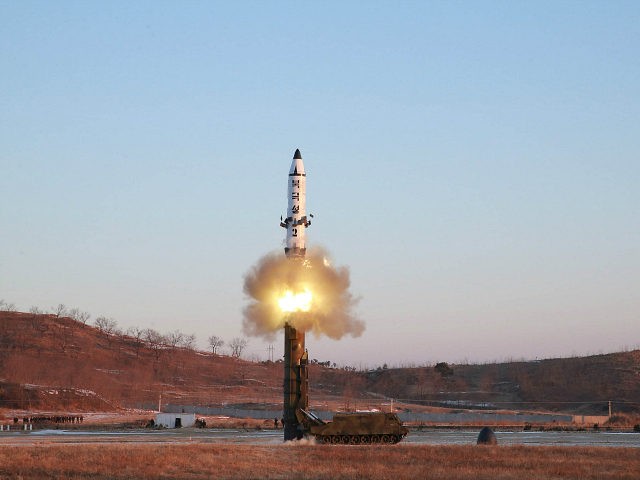Thae Yong-ho, a former North Korean embassy official who became one of the highest-ranking defectors from his country, said on Thursday that a potential upcoming nuclear test by the outlaw regime in Pyongyang could “break the country in two pieces” and topple the government of Kim Jong-un.
Yonhap News reviews the evidence that such a North Korean nuclear test is forthcoming:
On Thursday, 38 North, a website run by the U.S.-Korea Institute at Johns Hopkins University’s School of Advanced International Studies, said that satellite imagery of the Punggye-ri nuclear test site in the northeast shows that substantial tunnel excavation is continuing at the North Portal, where the last four of the five underground nuclear tests by the North were conducted. The test, if made, will be 14 times more powerful than the previous test, it said.
Thae points out that such a powerful nuclear blast would be bad news for the people who live near the test site, and those folks already wake up every morning to the bad news that they live in North Korea:
“All northward roads and railways pass by Punggye-ri. If a massive explosion pollutes the area, and subsequently Pyongyang loses its control over the border areas of North Hamkyong Province, a massive defection will take place there,” he said.
The environmental pollution resulting from a failure to control a nuclear explosion in a small country like North Korea will almost be an apocalypse, he said.
The international community should be aware of the danger of the North’s large-scale nuclear test this time, he said.
“In particular, Punggye-ri is not far from China. Efforts to get China to help prevent the North from conducting a nuclear test should also be made,” he said.
38North, the group referenced by Yonhap News, believes Kim Jong-un wants a big, messy, dangerous nuclear test to further his “coercive strategy” against the United States. In fact, North Korea’s primary goal is proving that “strategic patience” will not slowly nibble away at Pyongyang’s resources and resolve until its nuclear program collapses. Decades of sanctions and diplomatic pressure will vanish in a cloud of fallout.
North Korea has long employed nuclear blackmail to squeeze money from the civilized nations around it and even threatened China with a refugee tidal wave should the Kim regime collapse, but this may prove an opportune moment for the Communist backwater to achieve one of its most difficult strategic goals: driving a wedge between its opponents, specifically the United States and South Korea. As 38North explains:
In the past, the DPRK has experienced some success in driving wedges between divergent US and ROK policy positions. Depending on the outcome of this year’s presidential election in South Korea, the North may find ample opportunity for wedge driving. However, the DPRK’s coercive strategy is vulnerable to being over-played, and in the hands of a young and relatively inexperienced leader there is an even greater likelihood of blowback from South Korea and China.
Gigantic nuclear explosions are a brutally effective means of reducing “blowback” from neighboring nations, especially those downwind of the test site. The current chaos in South Korea must be extremely tempting for Kim, especially since North Korea was always gleefully savage and misogynist in its treatment of impeached President Park Geun-hye.
U.S. Secretary of State Rex Tillerson is on his way to Asia, including stops in Japan, South Korea, and Beijing. His agenda includes convincing China to rein in North Korea, but Reuters speculates the Chinese are still angry about the deployment of the THAAD missile shield to North Korea, and President Donald Trump’s “repeated threats to impose punitive tariffs on Beijing to correct a large trade imbalance.”
The possibility that South Korea will vote in a more liberal government to replace Park, and perhaps even back out of THAAD deployment, may also tempt Beijing to rebuff any demands Tillerson makes. Perhaps a 280-kiloton nuclear blast in troubling proximity to the Chinese border will change their minds.

COMMENTS
Please let us know if you're having issues with commenting.